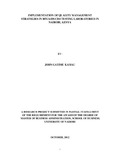| dc.contributor.author | Kamau, John G | |
| dc.date.accessioned | 2013-02-22T13:39:06Z | |
| dc.date.issued | 2012-10 | |
| dc.identifier.citation | MBA Thesis | en |
| dc.identifier.uri | http://erepository.uonbi.ac.ke:8080/xmlui/handle/123456789/10793 | |
| dc.description | Implementation of quality management strategies in HIV/AIDS cd4 testing laboratories in Nairobi, Kenya | en |
| dc.description.abstract | It is estimated that 1.5 million people in Kenya are infected with Human Immunodeficiency Virus (HIV). In persons with HIV, CD4 Testing is essential in their clinical management and in the determination of the appropriate time to initiate antiretroviral therapy (ART). CD4 counts are also used in monitoring HIV disease progression and the effectiveness of ART. Therefore, CD4 testing is a critical component of HIV/AIDS care and treatment and because of this; a strong need exists for good Quality Assurance (QA) strategies, incorporating both Internal Quality Control (IQC) and External Quality Assessment (EQA) for CD4 enumeration. Despite the importance of quality assurance in CD4 testing, most HIV/AIDS CD4 testing laboratories in Kenya do not adhere to quality assurance procedures such as internal quality control and external quality assessments which are important strategies in the management and treatment of HIV infected persons. These strategies either do not exist at all, and where such strategies exist, they are poorly implemented. A strong need therefore existed to assess the level of awareness and implementation of these quality practices. The main objectives of this study were to assess the implementation of quality management strategies (internal quality control and external quality assessment strategies) and establish the challenges of quality management strategy implementation in HIV/AIDS CD4 testing laboratories in Nairobi Kenya. A cross-sectional survey was conducted across HIV/AIDS CD4 testing laboratories in Nairobi Kenya where questionnaires were administered by face-face interviews with the laboratory personnel, laboratory supervisors/managers regarding the quality assurance procedures in the HIV/AIDS CD4 testing laboratories. A total of 21 HIV/AIDS CD4 testing laboratories were assessed, majority of which were clinical services laboratories, followed by research laboratories. With regard to the implementation of quality management strategies, more than half of the HIV/AIDS CD4 testing laboratories assessed in this study had implemented IQC strategies, while more than a third had not implemented the IQC strategies. Majority of these laboratories had implemented EQA strategies in HIV/CD4 testing while a quarter of these laboratories had not implemented EQA strategies. The major challenges of strategy implementation included the lack of knowledge on the quality management practices, procurement of IQC and EQA materials, management resistance and inadequate funding. Slow procurement process emerged as the most significant challenge to quality management strategy implementation in HIV CD4 testing laboratories in Nairobi Kenya. The findings of this study show that a large number of HIV CD4 testing laboratories have not implemented HIV/AIDS CD4 testing IQC and EQA quality management strategies. This non-adherence to good quality management procedures means poor quality and unreliable CD4 test results. In this regard there is a need to establish a monitoring system to laboratories performing CD4 testing for the purpose ensuring that activities related to quality assurance procedures are followed. Personnel doing HIV CD4 testing should be re-trained on the procedures of HIV CD4 testing and quality assurance strategies. | en |
| dc.description.sponsorship | University of Nairobi | en |
| dc.language.iso | en | en |
| dc.subject | Quality management strategies | en |
| dc.subject | HIV/AIDS cd4 testing | en |
| dc.subject | Kenya | en |
| dc.title | Implementation of quality management strategies in HIV/AIDS cd4 testing laboratories in Nairobi, Kenya | en |
| dc.type | Thesis | en |
| local.publisher | School of Business, University of Nairobi | en |

